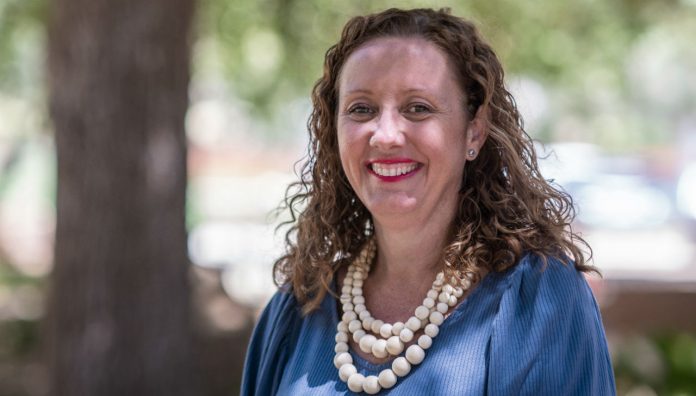Faye McMillan is a pioneer, paving the way for other Aboriginal and Torres Strait Islander people who want to work in the pharmacy profession. When she’s not busy winning awards, she works as a community pharmacist, university lecturer and is a founding member of Indigenous Allied Health Australia.
Why did you decide to become a pharmacist?
Over 20 years ago, I was working as a pharmacy assistant in my hometown of Trangie (NSW) when I thought to myself, ‘I actually want to be the pharmacist.’ The pharmacist I was working with at the time was extremely supportive and encouraged me to apply to study. I ended up being part of the inaugural cohort of students when Charles Sturt University introduced their pharmacy program in Wagga Wagga, NSW in 1997.
What’s the main focus of your practice?
I’m a community pharmacist, and I also teach in the area of Indigenous health, mental health and pharmacy at CSU. But the main focus of my work is patient-centred care, and ensuring that I’m working with people, so that they feel engaged. That’s what really drew me to pharmacy in the first place – an opportunity to have a relationship and help people as they navigate their health journey.
You’re passionate about recruiting Indigenous Australians into healthcare. What work do you do in this area?
As a founding member of Indigenous Allied Health Australia (IAHA), we strive to recognise Aboriginal and Torres Strait Islander people in the allied health workforce. I sat on the board from its inception in 2009 until 2017 and I was also the chair from 2010–2016. We started with just seven members, now we have 1,500.
IAHA is seen as one of the key bodies representing Aboriginal and Torres Strait Islander people to government and was involved in the development and implementation of the National Aboriginal and Torres Strait Islander Health Plan. We also work with universities to ensure that when Aboriginal and Torres Strait Islander students undertake allied health courses, they are being provided with support, mentors and networking opportunities.
But at IAHA, it’s not just about how we recruit people, it’s how we retain them. We work to ensure they feel engaged, not just in their profession but as a part of their community in the form of a trained healthcare professional.
You were Australia’s first registered Indigenous pharmacist and won the 2019 NSW Aboriginal Woman of the Year Award. How do you feel about being a role model?
It didn’t sit comfortably at first, but I think I’ve settled into it and recognised that people do need role models. When I was starting out I looked around for role models, and I appreciated the journeys of the people who I looked up to. If I’m that to someone else, then that’s a wonderful thing. Sometimes you’re able to use the platform of being an award recipient to give a nuanced opinion or view, and we need people to take up those positions.
You’re also a member of PSA’s National Aboriginal Community Controlled Health Organisation Leadership Group. Why is pharmacist intervention in Indigenous health so important?
Pharmacists play an integral role in the lives of so many people, whether clinically, in the community, or in hospitals – there are so many touch points where pharmacists can be included to provide insight into the health of Aboriginal and Torres Strait Islander people. The knowledge and skills that pharmacists have through their education, their life experiences and by being a consistent presence in the community means that they are able to provide a point of reference for other health professionals.
The Leadership Group is making significant contributions by ensuring people have access to a highly skilled and trained workforce, as well as providing education around the medicines that are needed in these communities, while ensuring they are accessible and affordable.
What’s the next big project that you’re working on?
I’m putting the final touches on a mental health app that I’ve been developing over the past 18 months. I wanted to create something that would provide meaningful support to people – not in place of trained mental health professionals, of course. The app is an extension of an existing self-awareness app that keeps you connected with people you’ve identified in your contact list as your ‘caring community’. It assesses where people are sitting on the scale of mental wellness, followed by contact from someone who will reach out and have a conversation with you. It’s all about having real conversations – listening out for warning signs such as changes in the timbre of the voice, and pauses, things that are easily masked in social media use.
Get more news at www.australianpharmacist.com.au



 John Jones MPS, pharmacist immuniser and owner of My Community Pharmacy Shortland in Newcastle, NSW[/caption]
John Jones MPS, pharmacist immuniser and owner of My Community Pharmacy Shortland in Newcastle, NSW[/caption]


 Debbie Rigby FPS explaining how to correctly use different inhaler devices[/caption]
Debbie Rigby FPS explaining how to correctly use different inhaler devices[/caption]




 Professor Sepehr Shakib[/caption]
Professor Sepehr Shakib[/caption]

 Lee McLennan MPS[/caption]
Lee McLennan MPS[/caption]
 Dr Natalie Soulsby FPS, Adv Prac Pharm[/caption]
Dr Natalie Soulsby FPS, Adv Prac Pharm[/caption]
 Joanne Gross MPS[/caption]
Joanne Gross MPS[/caption]








